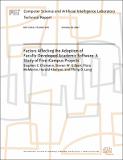Factors Affecting the Adoption of Faculty-Developed Academic Software: A Study of Five iCampus Projects
Author(s)
Ehrmann, Stephen C.; Gilbert, Steven W.; McMartin, Flora; Abelson, Harold; Long, Philip D.
DownloadMIT-CSAIL-TR-2007-045.ps (826.3Kb)
Additional downloads
Other Contributors
iCampus
Advisor
Hal Abelson
Metadata
Show full item recordAbstract
Instruction in higher education must adapt more rapidly to: changes in workforce needs, global issues, advances in disciplines, and resource constraints. The pace of such improvement depends on the speed with which new ideas and materials are adopted across institutions. In 1999 Microsoft pledged $25 million and staff support for iCampus, a seven-year MIT project to develop pioneering uses of educational technology. The TLT Group studied five iCampus projects in order to identify factors affecting institutionalization and widespread dissemination. Among the factors impeding adoption: lack of rewards and support for faculty to adopt innovations; faculty isolation; and a lack of attention to adoption issues among projects selected for funding. The study made recommendations for universities, foundations, government agencies and corporations: 1) continue making education more authentic, active, collaborative, and feedback-rich; 2) create demand to adopt ideas and materials from other sources by encouraging all faculty members to improve and document learning in their programs, year after year; 3) nurture coalitions for instructional improvement, across and within institutions; 4) create more effective higher education – corporate alliances; and 5) improve institutional services to support faculty in educational design, software development, assessment methods, formative evaluation, and/or in sharing ideas with others who teach comparable courses.
Date issued
2007-10-20Citation
37th ASEE/IEEE Frontiers in Education Conference
Other identifiers
MIT-CSAIL-TR-2007-045
Series/Report no.
Massachusetts Institute of Technology Computer Science and Artificial Intelligence Laboratory
Keywords
educational technology, educational innovation